Density of Cement sand and aggregate in Kg/m3 | list of material density | density of concrete, hi guys in this article we know about density of construction material like cement, sand, aggregate, cement mortar, concrete, RCC concrete, brick, AAC Block, fly ash brick,steel and other materials in different measuring unit like kg/m3, lb/ft3 and g/cm3 and their unit weight.
Density of Cement sand and aggregate in Kg/m3 | list of material density
Density is described as Unit Weight of material, another word weight of material comprising volume in specific unit. Knowing density of different material it is quite easy to calculate weight of given material in construction line.
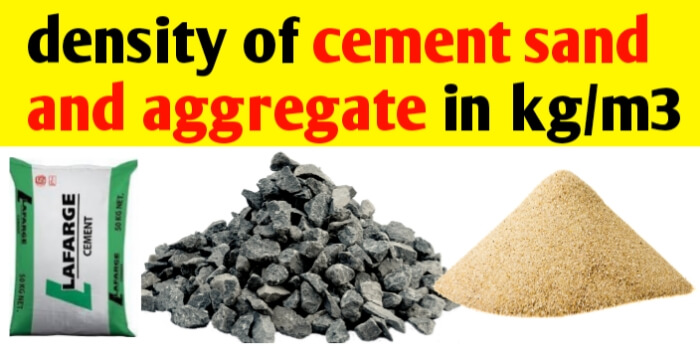
The density of a substance is its mass per unit volume. The symbol most often used for finding density is ρ (the lower case Greek letter rho), although the Latin letter D can also be used. Generally density is defined as mass divided by volume.
Density of material like cement sand and aggregate and other substance which are extensively used in construction line are measured in their specific unit kg/m3, g/m3,l b/ft3 and kg/ft3.
Density of material can be expressed as
p = m/V = 1/v
Where
p = density (measured in kg/m3, g/cm3, lb/ft3 and kg/ft3)
m = mass (measured in kg and gram
V = volume (measured in m3 and cft
And knowing important conversion factor
Conversion: 1 kg / m3 = 0.0624 lb / ft3.
Density of cement
The cement is a binder and adhesive material extensively used in construction line like building formation, super structure,multi storey building, over bridge, dams and other civil structure. It hardens and adheres to other materials to join them together. Cement is rarely used on its own, but to strong bond sand and gravel.
The typical density (unit weight) of cement that is commonly used in normal weight concrete is about 1,440kg/m3, or 1.440 g/cm^3, or 94 pounds per cubic foot and 14.40 kn/m3.
The cement mixed with fine aggregate produces cement mortar for masonry, or with sand and gravel produces concrete.
Density of cement in kg/m3
Density of cement measured in Kg/m3 (kilograms/cubic meter) such as density is the ratio of mass to volume, so density of cement in kg/m3 is 1440, in other word, 1440 kg/m3 is density of cement.
The typical density (unit weight) of cement commonly used in construction is about 1440 kg/m3. This means that 1 cubic meter of cement weighs about 1440 kg (or 1.44 tons).
Density of cement in g/cm3
● Density of cement in g/cm3: it is cgs unit of density, first we convert SI unit into cgs unit, 1km/m3 = 1000gram/ (100×100×100 cm3) = 1/1000 g/cm3.
Density of cement = 1440kg/m3, then density of cement in g/cm3 = 1440/ 1000 = 1.440, so 1.440 is density of cement in g/cm3.
The typical density (unit weight) of cement commonly used in construction is about 1.44 g/cm3. This means that 1 cubic centimeter of cement weighs about 1.44 grams.
Density of cement in lb/ft3
● density of cement in lb/ft3: density of cement measured in foot pound system, and we know conversion factor: 1 kg / m3 = 0.0624 lb / ft3, then density of cement in lb/ft3 = 0.0624 ×1500 = 94, so 94 is density of cement in lb/ft3.
The typical density (unit weight) of cement commonly used in construction is about 94 lb/ft^3. This means that 1 cubic foot of cement weighs about 94 pounds (or 0.047 US tons).
Density of cement in kg
Density of cement in kg: we know that Unit Weight of density is 1440 kg/m3, it means one cubic metre volume of cement weight in kg is 1440, so 1440 is density of cement in Kg.
Density of cement in kN/m3
Density of cement in kN/m3: we know that 1kN/m3 = 1000 N/m3 and 1kg/m3 = 10 N/m3, so 1440 kg/m3 = 14400 N/m3, now find out density of cement in kN/m3 = 1440/100 = 14.40, so density of cement in kN/m3 is 14.40.
The typical density (unit weight) of cement commonly used in construction is about 14.40 kN/m3. This means that 1 cubic meter of cement weighs about 14.40 kilo Newton.
● density of dry cement is 1440 kg/m3 and density of cement bag is 1440 kg/m3.
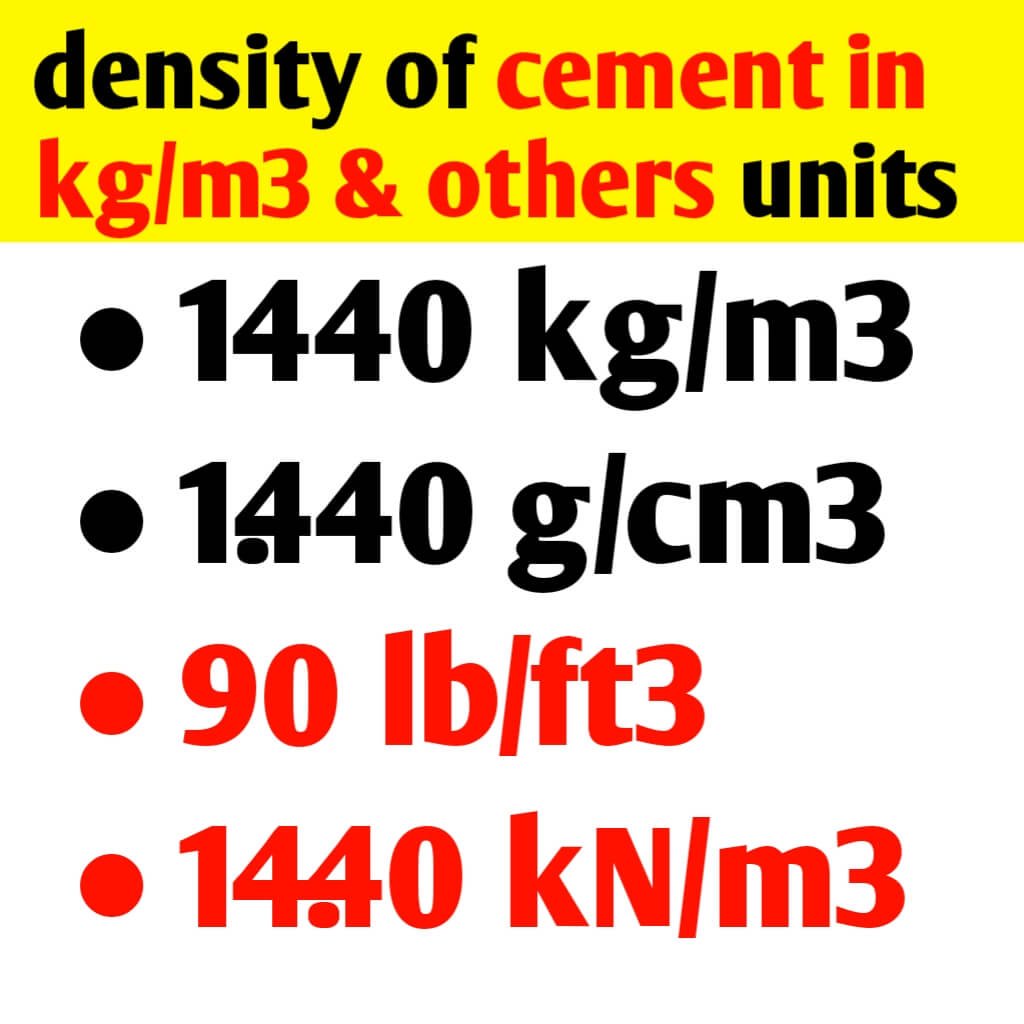
#Summary:-
1) 1440 is density of cement in kg/m3
2) 1.440 is density of cement in g/cm3
3) 94 is density of cement in lb/ft3
4) 14.40 is density of cement in kN/m3.
Density of cement mortar
When cement material are mixed with find sand to form cement mortar which are used in plastering and brickwork. Mix ratio of cement and sand are different for different type of plastering and brickwork.
Density of cement mortar measured in kg/m3 is around 2162 kg/m3, when it is measured in g/cm3, then their density is 2.162 g/cm3, measured in lb/ft3 which is equal as 135 lb/ ft3 (2162× 0.0624 = 135 lb/ft3) and in kN/m3 is 21.62.
The typical density (unit weight) of cement mortar commonly used in construction is about 2162 kg/m3. This means that 1 cubic meter of cement mortar weighs about 2162 kg (or 2.162 tons).
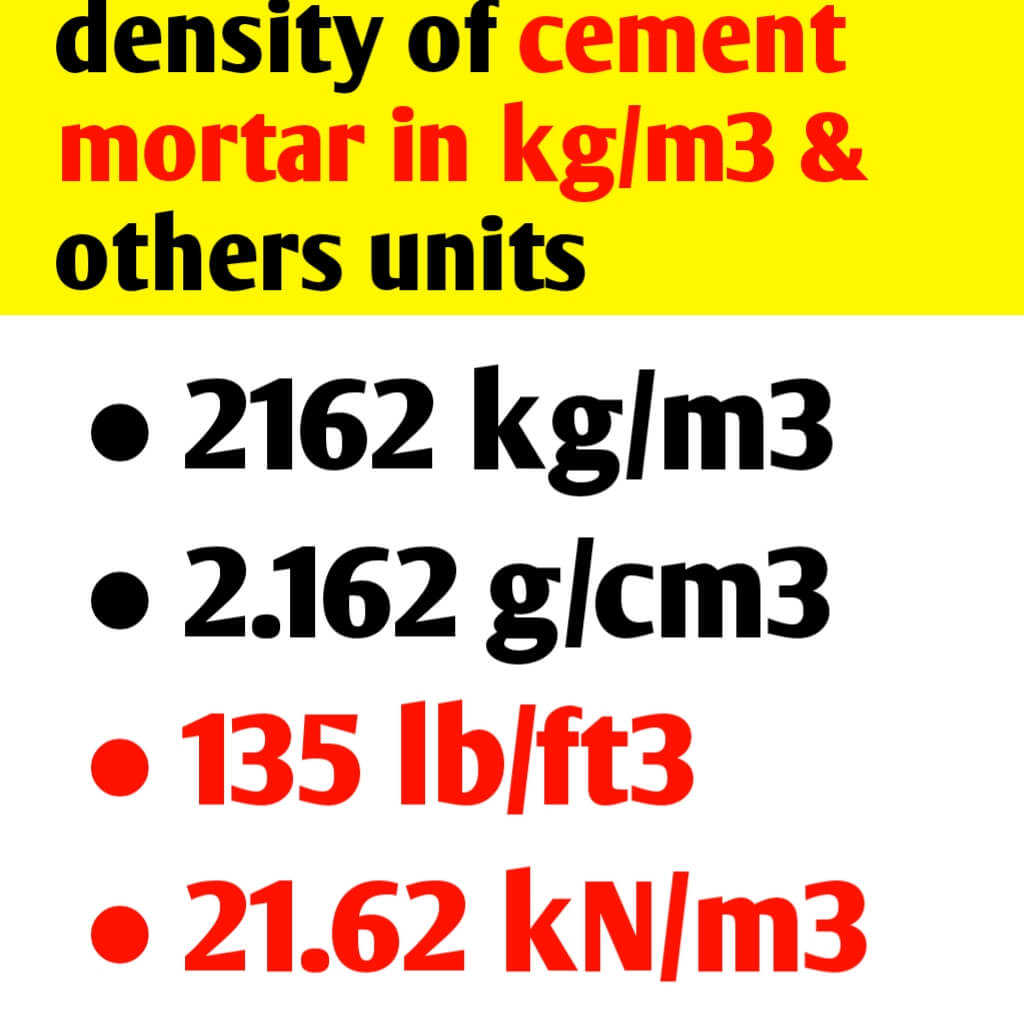
#Summary:-
1) 2162 is density of cement mortar in kg/m3
2) 2.162 is density of cement mortar in g/cm3
3) 135 is density of cement mortar in lb/ft3
4) 21.62 is density of cement mortar in kN/m3.
Density of cement concrete
When cement is mixed with sand an aggregate is known as plain cement concrete. For concreting and RCC work like footing, column, beam and slab and for PCC work.
Density of cement concrete is around 2400 kg/m3 for plain cement concrete and 2500 kg/m3 for reinforced concrete.
Concrete density kg/m3: Density of reinforced cement concrete (RCC) is 25 Kn/m3 or 2500 Kg/m3 and plain cement concrete (PCC) is 24kn/m3 or 2400 kg/m3 which is approximately equal as 156lb/ft3.
Density of cement concrete is 2400 kg/m3, when it is measured in g/cm3, then it is 2.4 g/cm3, measured in lb/ft3 then it is 156 lb/ft3 = 2500 × 0.0624 = 156 lb/ft3 and in kN/m3 is 24.0.
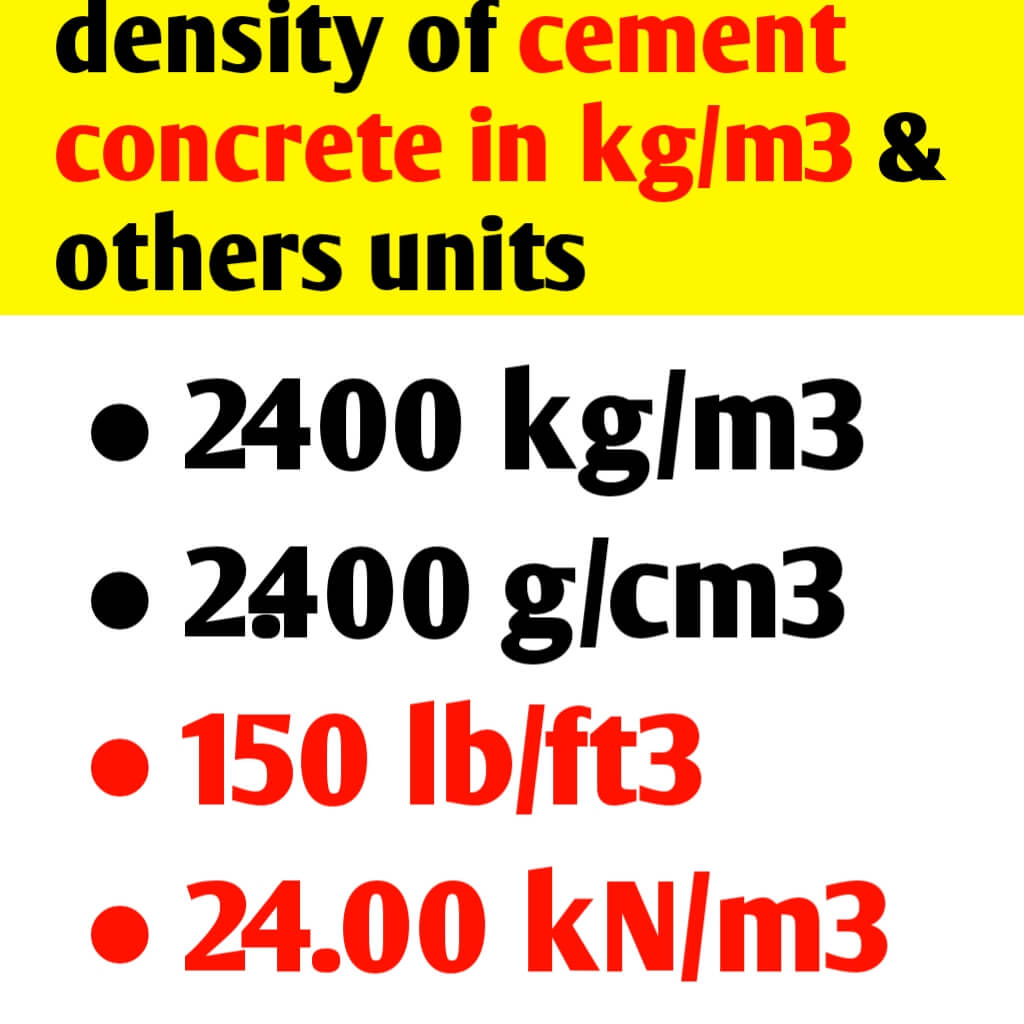
Density of concrete in kg/m3
The typical density (unit weight) of concrete commonly used in construction is about 2400 kg/m3. This means that 1 cubic meter of concrete weighs about 2400 kg (or 2.4 tons).
Concrete density in kg/m3:- density of concrete is around 2400 kg/m3 for plain cement concrete and 2500 kg/m3 for reinforced concrete in metric system of measurement, slightly it may be vary according to their grade and strength.
Density of concrete in lb/ft^3
Concrete density in lb/ft^3:- density of concrete is around 133 lb/ft^3 for plain cement concrete in dry mix and 150 lb/ft^3 in wet mix and for reinforced concrete it will be 156 lb/ft3 based on Imperial or US customary system of measurement.
The typical density (unit weight) of concrete commonly used in construction is about 150 lb/ft^3. This means that 1 cubic foot of concrete weighs about 150 pounds (or 0.075 US tons).
Density of concrete in lb/yd^3
The typical density (unit weight) of concrete commonly used in construction is about 4050 lb/yd^3. This means that 1 cubic yard of concrete weighs about 4050 pounds (or approx. 2 US tons).
Concrete density in lb/yd^3:- density of concrete is around 3600 lb/yd^3 for plain cement concrete in dry mix and 4050 lb/yd^3 in wet mix and for reinforced concrete it will be 4210 pounds per cubic yard (lb/yd^3) based on Imperial or US customary system of measurement.
#Summary:-
1) 2400 is density of cement concrete in kg/m3
2) 2.40 is density of cement concrete in g/cm3
3) 150 is density of cement concrete in lb/ft3
4) 24.0 is density of cement concrete in kN/m3.
The typical density (unit weight) of concrete commonly used in construction is about 2.4 g/cm^3. This means that 1 cubic centimeter of concrete weighs about 2.4 grams.
The typical density (unit weight) of concrete commonly used in construction is about 24 kN/m3. This means that 1 cubic meter of concrete weighs about 24 kilo-Newton.
Density of sand
The Density of sand material returns sand density based on sand conditions (wet/ dry in bulk / packaged).
The density of the sand is vary if the sand is compacted (bulged) or loose and if it is wet or dry. When packed, the grains of sand are forced to form a narrower formation, and more matter is in the volume.
The typical density (unit weight) of sand commonly used in construction works is about 1600 kg/m3. This means that 1600 kg (or 1.6 tons) of sand takes up 1 cubic meter of volume.
Density of sand in lb/ft^3 and in lb/yd^3
Sand density:- in United State, according to US customary measurement system, density of sand (dry weighs) is around 2700 pounds per cubic yard [lbs/ yd^3] which is approximately equal to 100 pounds per cubic foot [lbs/ ft^3].
The typical density of sand commonly used in construction work is range between 1450 and 2082 kg/m3 depending on different conditions such as wet, dry, loose, dry, dusty, packed and wet packed.
Density of coarse sand is ranging between 1450 – 2082 kg/m3 depending on different condition like wet,dry, loose, dry packed and wet packed.
Sand may be natural sand or manufactured. Natural sand is collected from river Basin and manufactured sand (m sand) is made crushing of stones in Crusher mill.
Locally available river sand have density 1710 kg/m3 is used and specific gravity is 2.65 and finance of modulus of river sand is 5.24.
Crush sand (M sand) density
The typical density of crush sand is about 1750 kg/m3. A typical crush sand (M sand) is used as partial replacement of fine sand in construction and the density of M /crush sand is about 1750 kg/m3, and specific gravity and fineness of modulus is found to be 2.73 and 4.66 respectively.
Density of sand in kg/m3
Density of sand measured in different unit like kg/m3, g/cm3, lb/ft3 and kN/m3. When the sand is wet, the water is in the sand, also affecting the total matter in the volume. The average density of the different sand conditions is as follows:
The typical density of loose sand is about 1442 kg/m3. This means that 1 cubic foot of loose sand weighs about 1442 kg (or 1.442 tons). It is dry sand that has been moved or agitated to loosen the natural packaging process.
● Dry sand: density of dry sand in kg/m3 is 1602. It is sand in its undisturbed natural form, where it has been partially compacted by rain and gravity over time, but is now dry
● Packed sand: density of packed sand in kg/m3 is 1682. Sand that has been packed manually or mechanically (compacted)
● Wet sand: density of wet sand in Kg/m3 is 1922. This is the sand that has been in a natural and naturally compressed environment that is now wet.
● Wet packed sand: 2082 kg / m3. This is compacted sand that is also almost saturated with water.
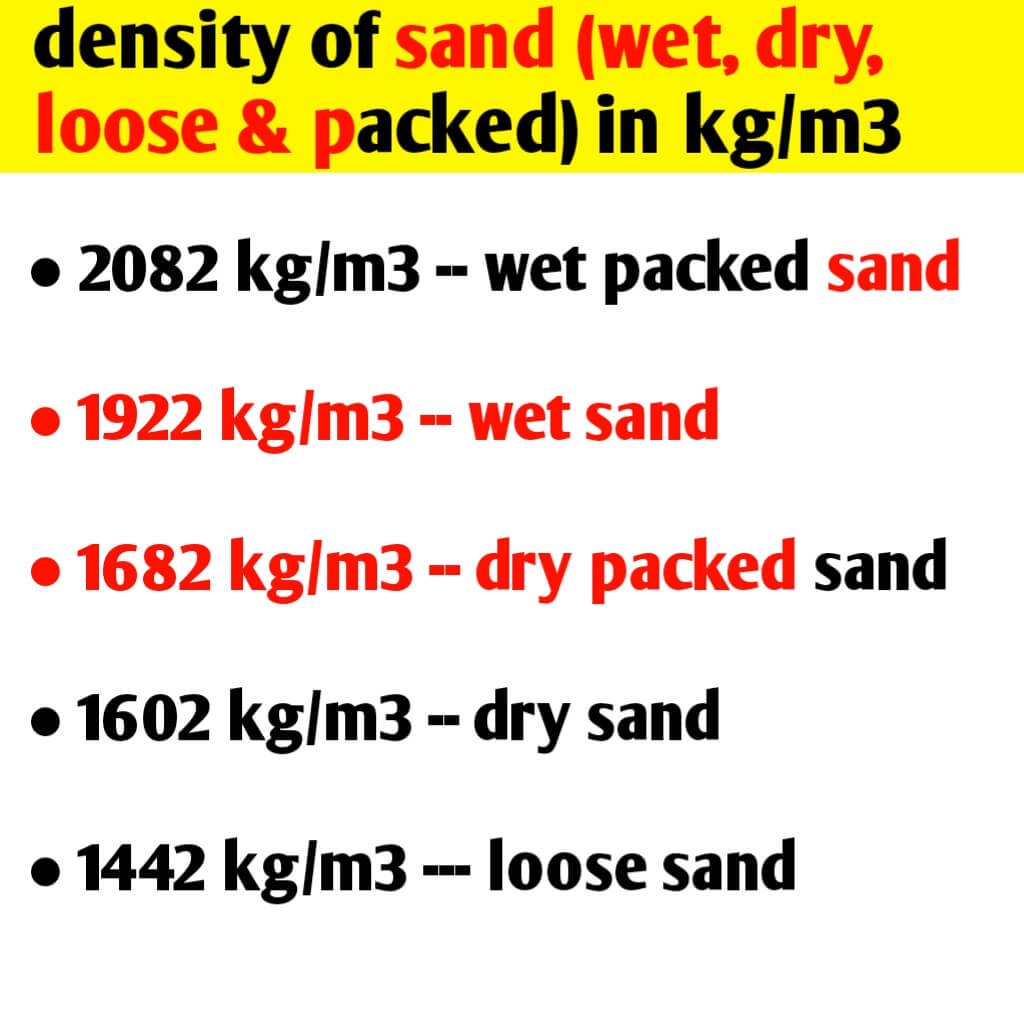
#summary
● 2082 kg/m3 – density of wet packed sand
● 1922 kg/m3 – density of wet sand
● 1682 kg/m3 – density of packed sand
● 1602 kg/m3 – density of dry sand
● 1442 kg/m3 – density of loose sand
Now discuss density of sand in other unit like lb/ft3,g/cm3 and kN/m3.
● density of sand in lb/ft3:- we know that sand density is 1450 – 2082 kg/m3, converting it into lb/ft3 minimum = 1450×0.0624 =90 and maximum = 2082×0.0624 =130, so density of sand in lb/ft3 is ranging between 90 – 130.
● density of sand in g/cm3: we know 1kg/m3=1/1000 g/cm3,so density of sand in g/cm3 is ranging between 1.450 – 2.082.
● density of sand in kN/m3: we know 1kg/m3=1/100 kN/m3, so density of sand in kN/m3 is ranging between 14.50 – 20.82.
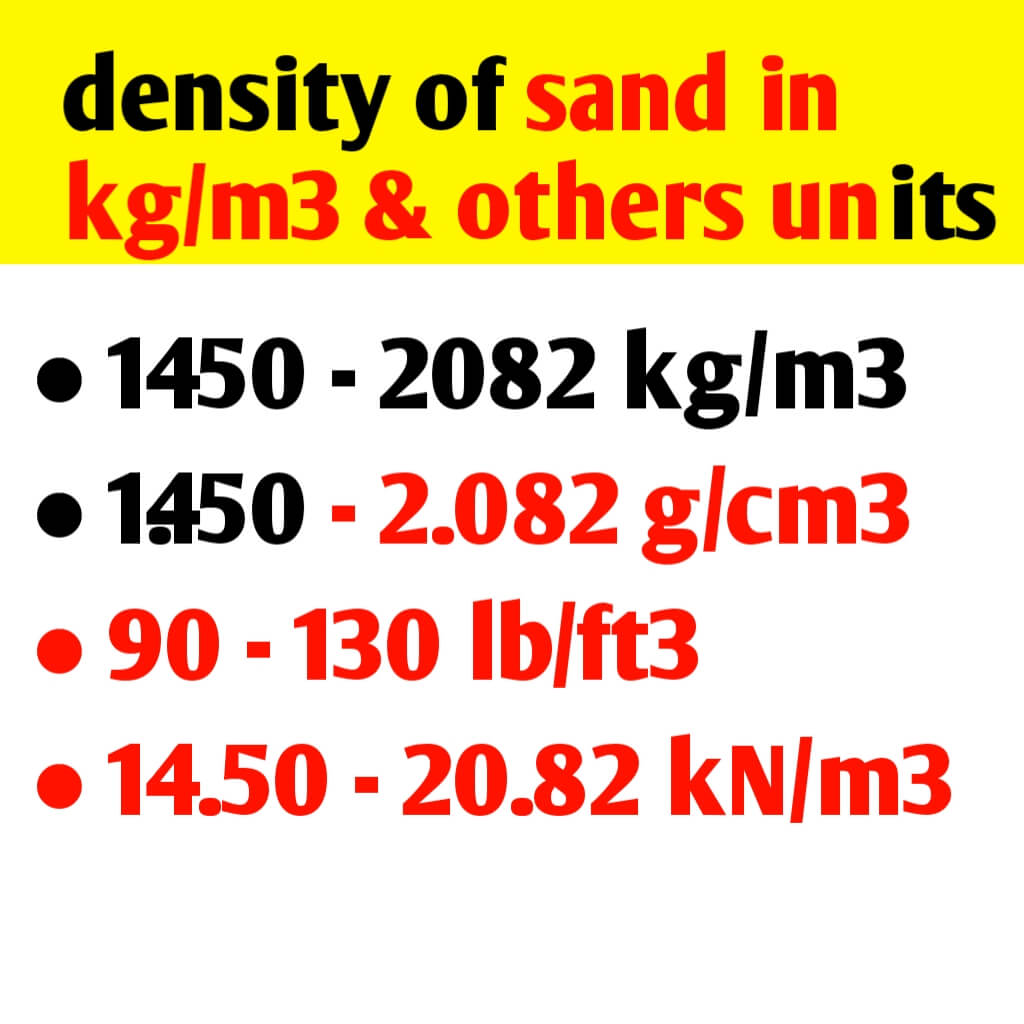
#summary
● 1450 – 2082 kg/m3 – density of sand in kg/m3
● 1.450 – 2.082 g/cm3 – density of sand in g/cm3
● 14.50 – 20.82 kN/m3 – density of sand in kN/m3
● 90 – 130 lb/ft3 – density of sand in lb/ft3
Density of aggregate (coarse sand)/ gravel
The aggregate (coarse sand)/ gravel is an aggregation of non-metallic minerals obtained in the form of particles and can be processed and used in the construction of civil and road engineering.
Aggregate density:- The typical density of aggregate commonly used in construction to prepare normal weight concrete is range between 1200 and 1750 kg/m3 (or 75 – 110 lb/ ft^3) depending on different conditions such as size, wet, dry, loose, dry packed and wet packed.
Aggregates Are Mainly Classified into Two Categories: 1)Fine aggregate (10mm) and 2) Coarse aggregate (20 mm and 40mm).
The fine aggregate is natural sand that has been washed and sieved to remove particles larger than 5 mm, and the coarse aggregate is a gravel that has been crushed, washed and sieved so that the particles vary from 5 to 50 mm in size. The fine and coarse aggregate is delivered separately.
As they need to be sieved, a prepared mixture of fine and coarse aggregate is more expensive than the natural all-in aggregate.
The reason for using a mixture of fine and coarse aggregate is that by combining them in the correct proportions, concrete with very few voids or spaces can be made, and this reduces the amount of comparatively expensive cement needed to produce strong concrete.
Density of aggregate in kg/m3
Bulk Density of the Aggregate
The apparent density or unit weight of an aggregate is the Mass or weight of the aggregate needed to fill a container with a specified unit volume.
The typical density of aggregate commonly used in construction is range between 1200 and 1750 kg/m3, or an average of 1500 kg/m3 depending on different conditions such as size wet, dry, loose, dry, dusty, packed and wet packed.
Density of aggregate in kg/m3:- the approximate apparent density of the aggregate that is commonly used in normal-weight concrete work is between 1200-1750 kg/m3, but for estimating purpose it would be taken as 1500 kg/m3 by Builders and contractors.
Bulk density = Mass / volume
If the volume is one unit, Bulk density = Mass.
In this definition, the volume contains the aggregates and the voids between the aggregate particles.
Density of gravel in lb/ft^3
Density of gravel in lb/ft^3:- the approximate apparent density of the aggregate/gravel that is commonly used in normal-weight concrete work is between 75 -110 lb/ ft^3, but for estimating purpose it would be taken as 110 lb/ft^3 by Builders and contractors.
Density of gravel in lb/yd^3
Density of gravel in lb/yd^3:- the approximate apparent density of the aggregate/gravel that is commonly used in normal-weight concrete work is between 2025 -3000 lb/ yd^3, but for estimating purpose it would be taken as 3000 lb/yd^3 by Builders and contractors.
Here, the standard test method for determining the apparent density of aggregates is presented in the ASTM C 29 (AASHTO T 19) standard.
● The relative density of aggregate:
the relative density (specific gravity) of an aggregate is the ratio between its Mass and the Mass of an equal volume of water.
Relative density = Mass of the aggregate / Mass with an equal volume of water
Most aggregates have a relative density between 2.4-2.9 with a corresponding particle density (Mass) of 2400-2900 kg/m3 (150-181 lb /ft3).
Here, for coarse aggregates, the standard test method was explained in ASTM C 127 (AASHTO), and, for fine aggregates, the standard test method was explained in ASTM C 128 (AASHTO).
The relative density of an aggregate can be determined on an oven-dried basis or on a dry saturated surface (SSD).
Now discuss density of aggregate in other units like lb/m3,g/cm3 and kN/m3.
● density of aggregate in lb/ft3:- we know that aggregate density is 1200 – 1750 kg/m3,converting it into lb/ft3 minimum = 1200×0.0624 =75 and maximum = 1750×0.0624 =109, so density of aggregate in lb/ft3 is ranging between 75 – 109.
● density of aggregate in g/cm3: we know 1kg/m3=1/1000 g/cm3,so density of aggregate in g/cm3 is ranging between 1.200 – 1.750
● density of aggregate in kN/m3: we know 1kg/m3=1/100 kN/m3, so density of aggregate in kN/m3 is ranging between 12.00 – 17.50.
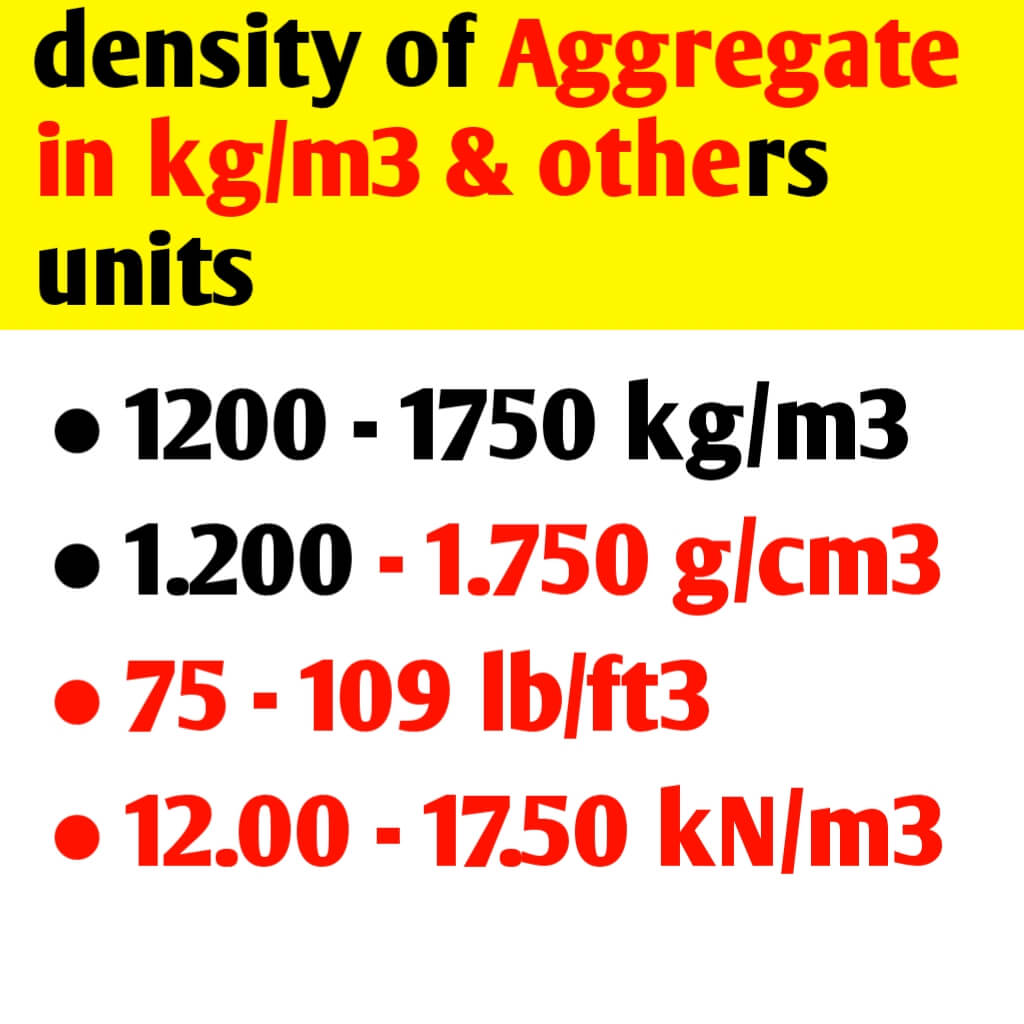
#summary
● 1200 – 1750 kg/m3 – density of aggregate in kg/m3
● 1.200 – 1.750 g/cm3 – density of aggregate in g/cm3
● 12.00 – 17.50 kN/m3 – density of aggregate in kN/m3
● 75 – 109 lb/ft3 – density of aggregate in lb/ft3.
Density of coarse aggregate
● density of coarse aggregate: there are two types of aggregate used in construction fine aggregate and coarse aggregate. the size of fine aggregate is 10mm & 12mm and the size of coarse aggregate is 20 mm and 40mm used in construction
as we know density of fine aggregate is more compare to density of coarse aggregate because fine aggregate have less presence of air voids than coarse aggregate. So density of aggregate 10mm is higher of other aggregate size.
Density of coarse aggregate 20mm and 40mm ranging between 1200 – 1450 kg/m3 (75 -90 lb/ft3) and density of fine aggregate 10mm and 12mm ranging between 1600 – 1750 kg/m3 (100 – 109 lb/ft3).
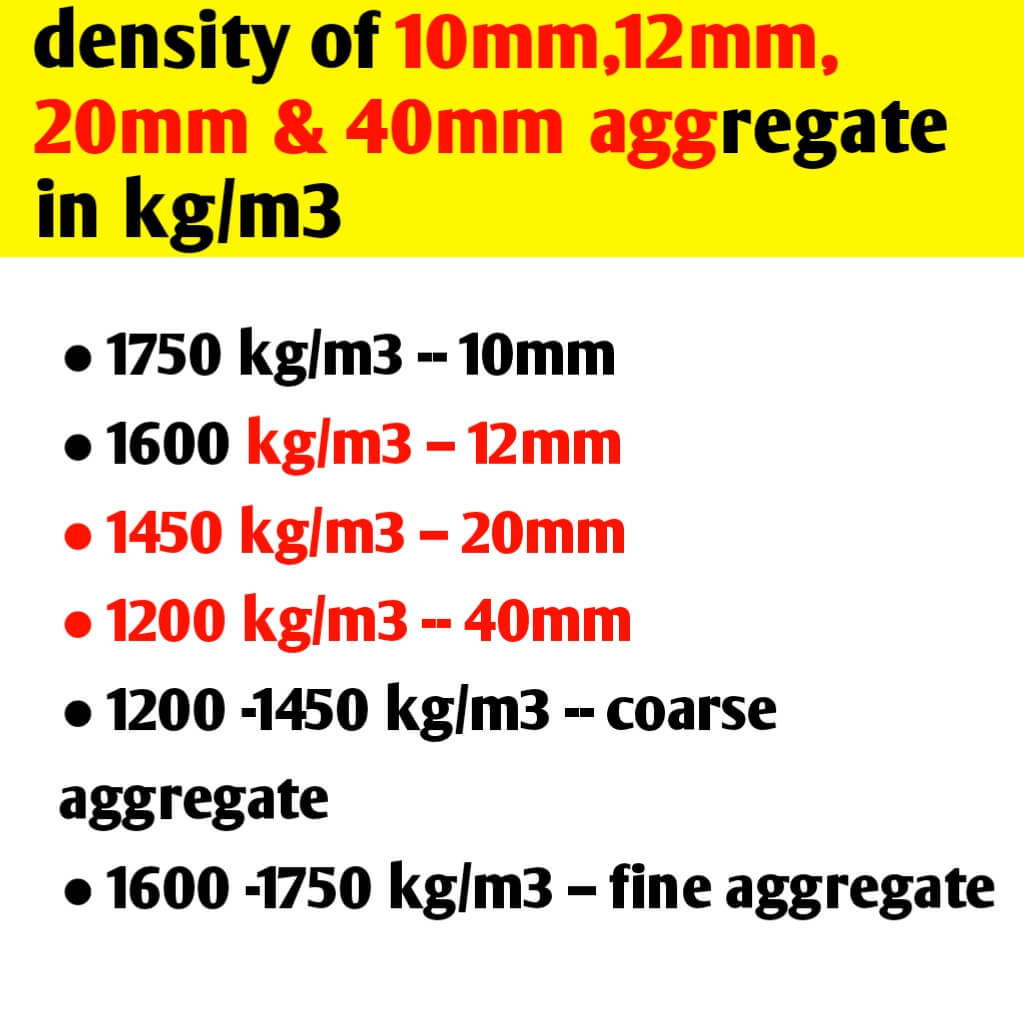
#summary
● 1750 kg/m3 – density of aggregate 10mm
● 1600 kg/m3 – density of aggregate 12mm
● 1450 kg/m3 – density of aggregate 20mm
● 1200 kg/m3 – density of aggregate 40mm.
● 1200 – 1450 kg/m3 – density of coarse aggregate
● 1600 – 1750 kg/m3 – density of fine aggregate
List of density of other construction material
● 1) Concrete density : concrete is mixture of cement sand and aggregate with water, density of concrete is measured in kg/m3,g/cm3,lb/ft3 and kN/m3.
Density of concrete is 2400 kg/m3 (2.400 g/cm3 or 24 kN/m3 or 150 lb/ft3).
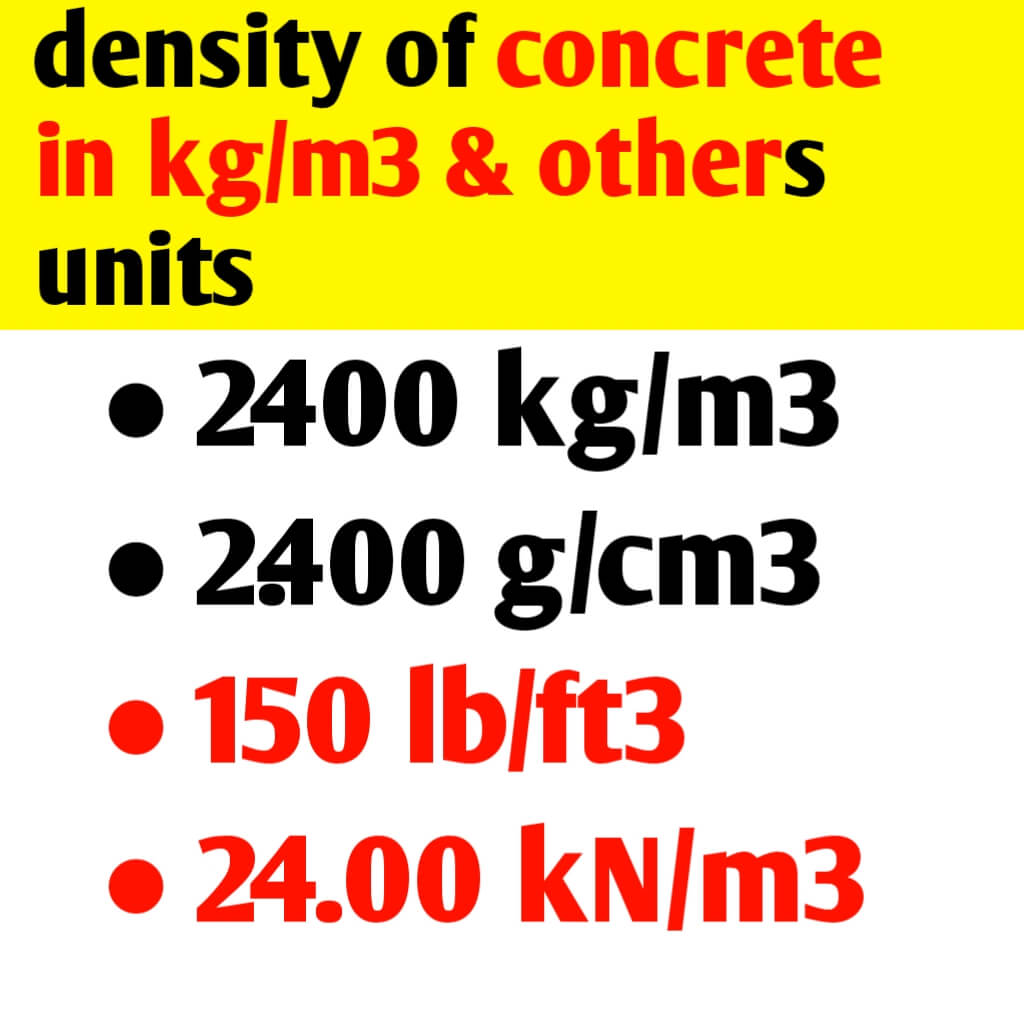
#summary
● 2400 kg/m3 – density of concrete in kg/m3
● 2.400 g/cm3 – density of concrete in g/cm3
● 24.00 kN/m3 – density of concrete in kN/m3
● 150 lb/ft3 – density of concrete in lb/ft3.
● 2) rcc Concrete density: RCC concrete (Reinforced cement concrete is mixture of steel,cement sand and aggregate with water, density of RCC concrete is measured in kg/m3,g/cm3,lb/ft3 and kN/m3.
Density of RCC is 2500 kg/m3 (2.500 g/cm3 or 25 kN/m3 or 156 lb/ft3).
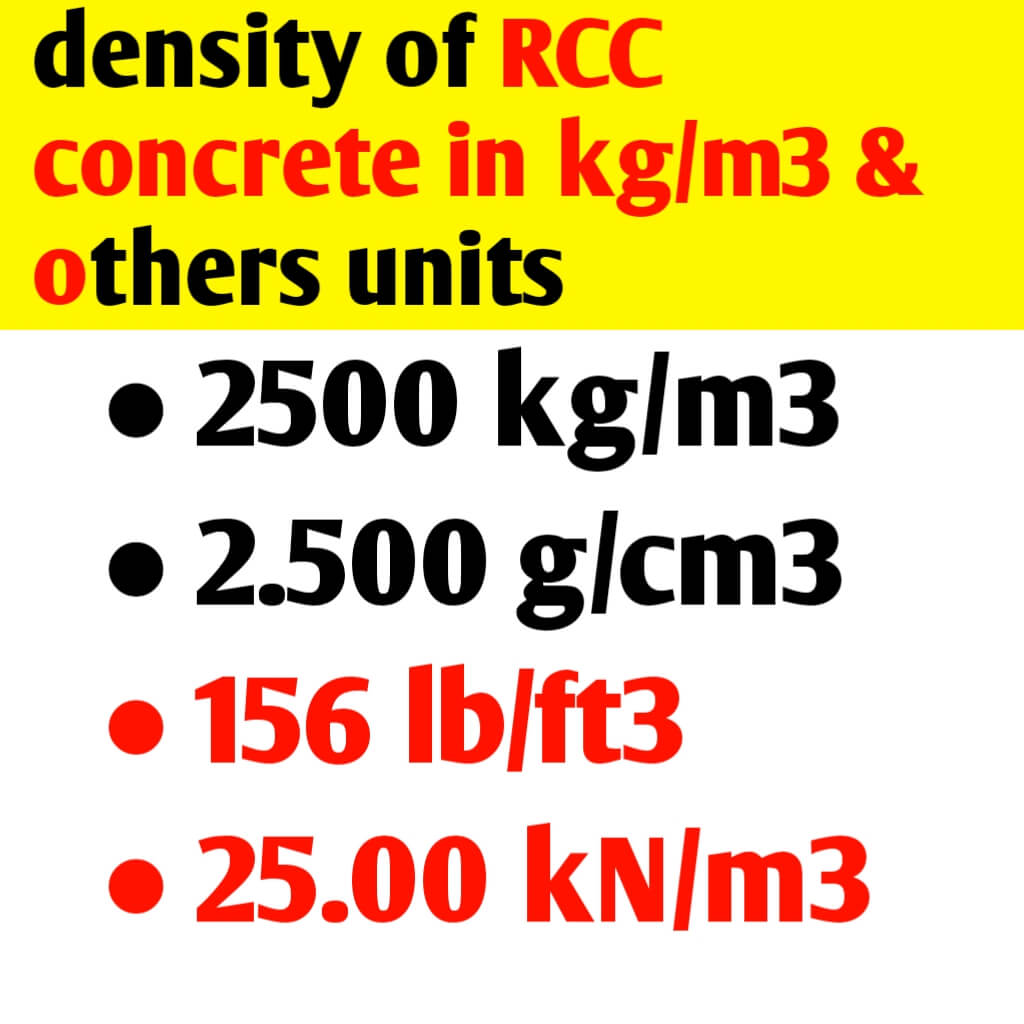
#summary
● 2500 kg/m3 – density of RCC concrete in kg/m3
● 2.500 g/cm3 – density of RCC concrete in g/cm3
● 25.00 kN/m3 – density of RCC concrete in kN/m3
● 156 lb/ft3 – density of RCC concrete in lb/ft3.
● 3) Brick density:- brick are used in brick wall masonry work, as we know that brick have many types first class, second class and 3rd class brick. The solid red clay brick which are used in brick wall masonry work have density ranging between 1600 – 1750 kg/m3.
Density of brick work also measured in other unit like g/cm3,lb/ft3 and kN/m3.
Density of solid red clay brick is ranging between 1600 – 1750 kg/m3 (1.600 – 1.750 g/cm3 or 16.0 – 17.50 kN/m3 or 100 – 110 lb/ft3).
#summary
● 1600 -1750 kg/m3 – density of brick wall masonry work in kg/m3
● 1.600 -1.750 g/cm3 – density of brick wall masonry work in g/cm3
● 16.00 -17.50 kN/m3 – density of brick wall masonry work in kN/m3
● 100 -110 lb/ft3 – density of brick wall masonry work in lb/ft3.
● 4) fly ash brick density: this bricks are manufacturing by mixing Quarry Dust / River Sand , Stone aggregates less than 6mm in Size, Cement and Fly Ash ( Fly Ash quantity will be 10% to 20% of Cement ).
Normally the actual cement quantity required will be replaced with 10% to 20% Fly Ash. Any brick contains cement will increase the heat inside building.
Fly Ash Bricks with plastering on both sides will again increase more Heat . When we are manufacturing One Metric Ton of Cement equal quantity of CO2 ( Carbon di Oxide ) will also get generated . So we are polluting the atmosphere. Density of fly ash brick ranging between 1700 – 1850 kg/m3.
Density of fly ash brick work also measured in other unit like g/cm3,lb/ft3 and kN/m3.
Density of solid fly ash brick is ranging between 1700 – 1850 kg/m3 (1.700 – 1.850 g/cm3 or 17.0 – 18.50 kN/m3 or 106 – 116 lb/ft3).
#summary
● 1700 -1850 kg/m3 – density of fly ash brick wall masonry work in kg/m3
● 1.700 -1.850 g/cm3 – density of fly ash brick wall masonry work in g/cm3
● 17.00 -18.50 kN/m3 – density of fly ash brick wall masonry work in kN/m3
● 106 -116 lb/ft3 – density of fly ash brick wall masonry work in lb/ft3.
● 5) AAC block density : today in Modern construction work and for high rise building use of AAC Block is preferred compare to fly ash brick and red clay brick because of lightweight and a strong compressive strength. Density of AAC Block ( autoclaved aerated concrete) is ranging between 450 – 850 kg/m3
Density of AAC block work also measured in other unit like g/cm3,lb/ft3 and kN/m3.
Density of AAC block (autoclaved aerated concrete) is ranging between 450 – 850 kg/m3 (0.450 – 0.850 g/cm3 or 4.50 – 8.50 kN/m3 or 28 – 53 lb/ft3).
#summary
● 450 -850 kg/m3 – density of AAC block wall masonry work in kg/m3
● 0.450 -0.850 g/cm3 – density of AAC block wall masonry work in g/cm3
● 4.50 – 8.50 kN/m3 – density of AAC block wall masonry work in kN/m3
● 28 – 53 lb/ft3 – density of AAC block wall masonry work in lb/ft3.
◆You Can Follow me on Facebook and Subscribe our Youtube Channel
You should also visits:-
1)what is concrete and its types and properties
2) concrete quantity calculation for staircase and its formula
Conclusions:
The typical density of cement is about 1440 kg/m3, about 1600 kg/m3 for the typical sand, about 1500 kg/m3 for aggregate, about 2162 kg/m3 for the cement mortar and 2400 kg/m3 for the typical concrete.
very useful data
thank you
Very useful information on densities of cement, fine and aggregates, mortar, concrete and reinforced concrete.
Good material, very rich.